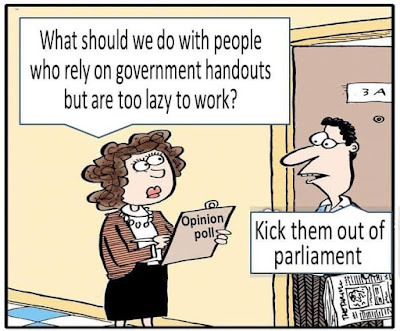#1
1. Said Ms Gan: "Mr Leong and PSP do not believe that Singapore should be an open city connected to the world... He wants Singapore to close up, for the top jobs to be given to Singaporeans only.
The Strawman argument.
Ms Gan is putting words in Mr. Leong's mouth.
Mr. Leong did not said he wants Singapore to close up, nor for all the top jobs to be given to Singaporeans only.
Mr. Leong asked why: "After all, retail banking is about our own domestic market, right? Can't it be 80 per cent, 90 per cent?"
2. Gan Siow Huang: "If we start telling companies that they can invest but can only employ Singaporeans for the top jobs, we will end up chasing some of them away, and thousands of good jobs for Singaporeans will be lost as well."
The Slippery Slope argument.
It is an unsubstantiated generalisation that thousands of good jobs will be lost. The jobs created may not be in the thousands, and the jobs may not be good.
Budget debate: Gan Siow Huang, Ong Ye Kung spar with Leong Mun Wai over foreign talent issue

Non-Constituency MP Leong Mun Wai proposed to impose a $1,200 monthly levy on Employment Pass holders.
ST PHOTO: JASON QUAH

Justin Ong
Political Correspondent
25 FEB 2021
SINGAPORE - Two People's Action Party office-holders crossed swords with Non-Constituency MP Leong Mun Wai over his proposal to impose a $1,200 monthly levy on Employment Pass (EP) holders, saying it signalled how his Progress Singapore Party favoured Singapore closing up instead of welcoming global companies and talent.
This was a view that the Government does not agree with, said Transport Minister Ong Ye Kung and Minister of State for Manpower Gan Siow Huang on Thursday (Feb 25).
They reiterated the Government's intent to strengthen the Singaporean core and to create more jobs for Singaporeans, after Mr Leong again raised the notion that foreigners were taking up jobs at the expense of locals.
Their back-and-forth was sparked by Mr Leong suggesting in his speech a levy on EP holders to level the playing field for Singaporeans suffering a "wage disadvantage" due to foreigners not being required to make Central Provident Fund (CPF) contributions.
In response, Ms Gan said a blanket levy on EP holders would "signal to foreign investors that we don't quite welcome them bringing in their own talent".
The Government constantly reviews the EP qualifying criteria to rebalance the foreign and local talent mix here, and had just raised the minimum qualifying salary from $3,900 to at least $4,500 in September last year, she added.
She also noted Mr Leong maintaining his position that foreigners were taking the helm of companies in Singapore - a theme he first brought up in his maiden parliamentary speech in September last year, when he commented that DBS was "still without a home-grown CEO".
The bank's current CEO, Mr Piyush Gupta, was born in India and became a Singapore citizen in 2009.
Said Ms Gan: "Mr Leong and PSP do not believe that Singapore should be an open city connected to the world... He wants Singapore to close up, for the top jobs to be given to Singaporeans only.
"We must try to strike a balance between… welcoming foreign talent and building our own talent at the same time. Our future depends on it. If we start telling companies that they can invest but can only employ Singaporeans for the top jobs, we will end up chasing some of them away, and thousands of good jobs for Singaporeans will be lost as well.
"And going by Mr Leong's logic, Singaporeans who are working overseas won't be given top jobs outside Singapore."
Replying, Mr Leong agreed that Singapore, as an open global city-state, would require foreigners coming in to complement locals.
But he said the "rebalancing" of the local-foreign mix was proceeding too slowly. "The problem is, do we have enough policies to ensure that Singaporeans have fair treatment?" he added.
He pointed to Singapore bank OCBC announcing in January the appointment of Ms Helen Wong, who was born in Hong Kong, as group chief executive.
"So what is MAS doing? In my maiden speech, I said that during my time in the 80s and the 90s, localisation was almost a must in our financial sector. Today, it doesn't seem to be even a KPI (for) MAS."
Mr Ong, a board member of the Monetary Authority of Singapore (MAS), then rose to speak.
He noted that he had a similar exchange with Mr Leong in September last year, where he outlined efforts by MAS in establishing Singapore as a global and international financial hub, and growing local talent to a level where Singaporeans can take up senior roles and hold their own overseas.
"Of course, we always wish there's a menu that says 'we get all the jobs, but yet no competition'," said Mr Ong.
"I'm sorry, there's no such menu. The menu is 'open up more competition, but we build capabilities, and we can seize more opportunities'.
"So I'm a little bit disturbed when I hear Mr Leong grandstanding, saying that all of this… localisation (and) building our own talent is not in MAS' KPI. I think that is grossly unfair and ignores everything that we have discussed earlier."
Mr Leong apologised, and said: "Maybe MAS does have the KPIs. But I think the KPIs are not showing enough results. I think a lot of Singaporeans still have doubts - like for example, the senior executive positions in the retail banking sector in Singapore, why should there still be 30 to 40 per cent of foreigners?
"After all, retail banking is about our own domestic market, right? Can't it be 80 per cent, 90 per cent?"
Mr Ong replied: "Why 30 per cent of retail bank managers are still foreigners? Because we are a global financial centre. We have 70 per cent, and a much larger pie with a larger share. But that is the essence of being an open and international financial centre."
Speaker of Parliament Tan Chuan-Jin then called on the next MP to speak, but Mr Leong interjected, saying: "Speaker, let me have my last say."
He was turned down. "No, we are moving on," said Mr Tan. "I think enough was said."
1. Said Ms Gan: "Mr Leong and PSP do not believe that Singapore should be an open city connected to the world... He wants Singapore to close up, for the top jobs to be given to Singaporeans only.
The Strawman argument.
Ms Gan is putting words in Mr. Leong's mouth.
Mr. Leong did not said he wants Singapore to close up, nor for all the top jobs to be given to Singaporeans only.
Mr. Leong asked why: "After all, retail banking is about our own domestic market, right? Can't it be 80 per cent, 90 per cent?"
2. Gan Siow Huang: "If we start telling companies that they can invest but can only employ Singaporeans for the top jobs, we will end up chasing some of them away, and thousands of good jobs for Singaporeans will be lost as well."
The Slippery Slope argument.
It is an unsubstantiated generalisation that thousands of good jobs will be lost. The jobs created may not be in the thousands, and the jobs may not be good.
Budget debate: Gan Siow Huang, Ong Ye Kung spar with Leong Mun Wai over foreign talent issue

Non-Constituency MP Leong Mun Wai proposed to impose a $1,200 monthly levy on Employment Pass holders.
ST PHOTO: JASON QUAH

Justin Ong
Political Correspondent
25 FEB 2021
SINGAPORE - Two People's Action Party office-holders crossed swords with Non-Constituency MP Leong Mun Wai over his proposal to impose a $1,200 monthly levy on Employment Pass (EP) holders, saying it signalled how his Progress Singapore Party favoured Singapore closing up instead of welcoming global companies and talent.
This was a view that the Government does not agree with, said Transport Minister Ong Ye Kung and Minister of State for Manpower Gan Siow Huang on Thursday (Feb 25).
They reiterated the Government's intent to strengthen the Singaporean core and to create more jobs for Singaporeans, after Mr Leong again raised the notion that foreigners were taking up jobs at the expense of locals.
Their back-and-forth was sparked by Mr Leong suggesting in his speech a levy on EP holders to level the playing field for Singaporeans suffering a "wage disadvantage" due to foreigners not being required to make Central Provident Fund (CPF) contributions.
In response, Ms Gan said a blanket levy on EP holders would "signal to foreign investors that we don't quite welcome them bringing in their own talent".
The Government constantly reviews the EP qualifying criteria to rebalance the foreign and local talent mix here, and had just raised the minimum qualifying salary from $3,900 to at least $4,500 in September last year, she added.
She also noted Mr Leong maintaining his position that foreigners were taking the helm of companies in Singapore - a theme he first brought up in his maiden parliamentary speech in September last year, when he commented that DBS was "still without a home-grown CEO".
The bank's current CEO, Mr Piyush Gupta, was born in India and became a Singapore citizen in 2009.
Said Ms Gan: "Mr Leong and PSP do not believe that Singapore should be an open city connected to the world... He wants Singapore to close up, for the top jobs to be given to Singaporeans only.
"We must try to strike a balance between… welcoming foreign talent and building our own talent at the same time. Our future depends on it. If we start telling companies that they can invest but can only employ Singaporeans for the top jobs, we will end up chasing some of them away, and thousands of good jobs for Singaporeans will be lost as well.
"And going by Mr Leong's logic, Singaporeans who are working overseas won't be given top jobs outside Singapore."
Replying, Mr Leong agreed that Singapore, as an open global city-state, would require foreigners coming in to complement locals.
But he said the "rebalancing" of the local-foreign mix was proceeding too slowly. "The problem is, do we have enough policies to ensure that Singaporeans have fair treatment?" he added.
He pointed to Singapore bank OCBC announcing in January the appointment of Ms Helen Wong, who was born in Hong Kong, as group chief executive.
"So what is MAS doing? In my maiden speech, I said that during my time in the 80s and the 90s, localisation was almost a must in our financial sector. Today, it doesn't seem to be even a KPI (for) MAS."
Mr Ong, a board member of the Monetary Authority of Singapore (MAS), then rose to speak.
He noted that he had a similar exchange with Mr Leong in September last year, where he outlined efforts by MAS in establishing Singapore as a global and international financial hub, and growing local talent to a level where Singaporeans can take up senior roles and hold their own overseas.
"Of course, we always wish there's a menu that says 'we get all the jobs, but yet no competition'," said Mr Ong.
"I'm sorry, there's no such menu. The menu is 'open up more competition, but we build capabilities, and we can seize more opportunities'.
"So I'm a little bit disturbed when I hear Mr Leong grandstanding, saying that all of this… localisation (and) building our own talent is not in MAS' KPI. I think that is grossly unfair and ignores everything that we have discussed earlier."
Mr Leong apologised, and said: "Maybe MAS does have the KPIs. But I think the KPIs are not showing enough results. I think a lot of Singaporeans still have doubts - like for example, the senior executive positions in the retail banking sector in Singapore, why should there still be 30 to 40 per cent of foreigners?
"After all, retail banking is about our own domestic market, right? Can't it be 80 per cent, 90 per cent?"
Mr Ong replied: "Why 30 per cent of retail bank managers are still foreigners? Because we are a global financial centre. We have 70 per cent, and a much larger pie with a larger share. But that is the essence of being an open and international financial centre."
Speaker of Parliament Tan Chuan-Jin then called on the next MP to speak, but Mr Leong interjected, saying: "Speaker, let me have my last say."
He was turned down. "No, we are moving on," said Mr Tan. "I think enough was said."
Last edited:





































